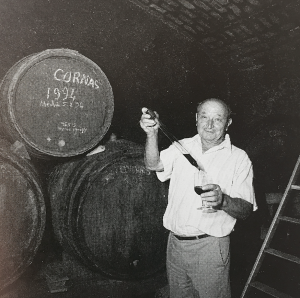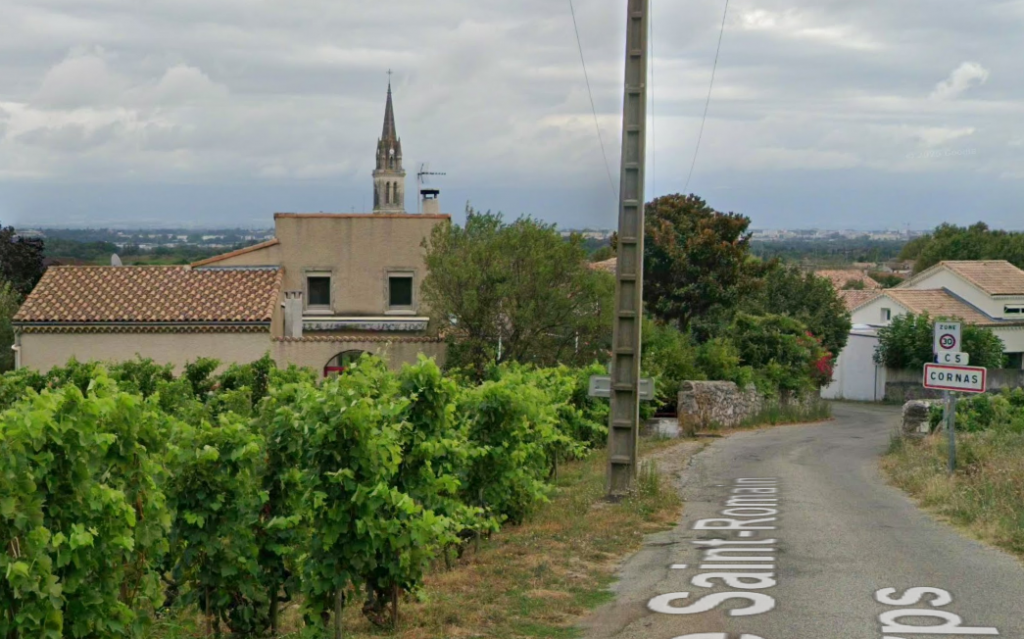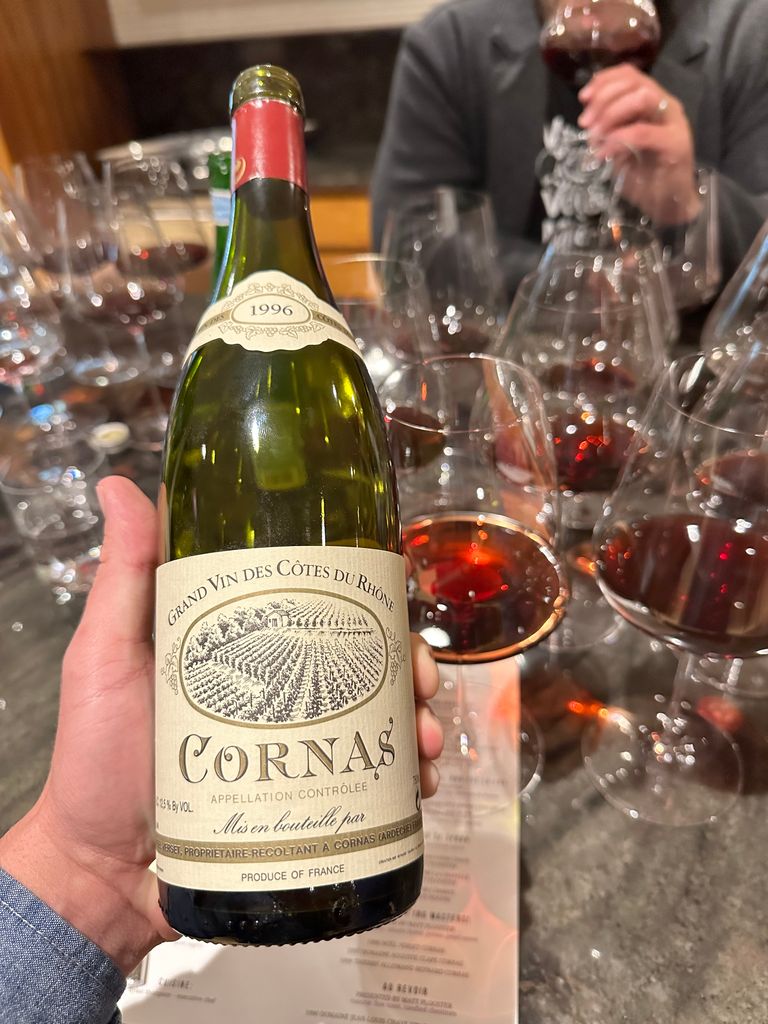There are few names in the Rhone Valley that carry the same weight and reverence as Noël Verset. For many sommeliers, collectors, and vignerons alike, he is not just a winemaker but the embodiment of Cornas itself. To speak of his wines is to speak of authenticity, a steadfast commitment to the land, and a vision of Syrah that resisted fashion while setting a standard of timeless beauty. Although Noël Verset retired in 2000 and passed away in 2015, his legacy lives on in every serious conversation about Cornas, a reminder that a single man can define the very identity of a place.



History of the Winery
Noël Verset was born in 1915 in Cornas, a village that, at the time, was still recovering from the devastation of phylloxera and the rural exodus that saw many vineyards abandoned. By the mid-20th century, Cornas was a quiet corner of the Northern Rhone, its steep granite slopes cultivated by only a handful of growers. Verset inherited small parcels of vines scattered across the appellation, many of them difficult to farm and clinging to near-vertical terraces. He took to his vocation with quiet determination, crafting wines that reflected the raw energy of Cornas long before the appellation gained international recognition.
For decades, Verset worked largely in obscurity, selling most of his wine to local merchants. It was not until the 1980s and 1990s that his bottles began to appear on the radar of sommeliers and critics beyond France, capturing the imagination of those searching for authenticity in a world increasingly shaped by technology and global tastes. His final vintage was 2006, produced with the help of his longtime friend and fellow vigneron Thierry Allemand. After his retirement, his vineyards were dispersed among some of the region’s leading growers, ensuring that the DNA of his Cornas lives on even if the label no longer does.
Winemaking and Grape Varieties
At the heart of Verset’s work was Syrah, the only permitted grape variety of Cornas and one he believed should be expressed without compromise. His approach to winemaking was deceptively simple but demanded immense patience and discipline. He practiced whole-cluster fermentation, eschewing the fashion for destemming, allowing stems to contribute structure, tannin, and a wild aromatic lift that became a hallmark of his wines. Fermentation took place in old concrete tanks, and élevage was carried out in large, well-seasoned oak barrels, often decades old, that imparted no intrusive flavors. There was no artifice, no attempt to polish or modernize; Verset trusted Syrah and granite to do the work, a philosophy that left his wines as pure expressions of terroir.
The resulting bottles were known for their remarkable capacity to age. In youth, they carried the earthy, meaty, and peppery character so deeply associated with Cornas, sometimes even rustic, but with time they evolved into wines of haunting perfume—violets, olives, smoke, and leather mingling in ways that critics have called Burgundian in their elegance. Each bottle bore the quiet signature of a man who sought nothing more than honesty in his craft.

The People Behind the Legacy
Noël Verset worked largely alone, supported by his wife and family, in a manner that reflected the small-scale traditions of the Rhone Valley. Unlike many estates that today employ large teams and consultants, his domaine was the work of one pair of hands and one steadfast philosophy. He was a man of humility, never seeking the spotlight, but his wines earned him the respect of fellow growers like Auguste Clape and, later, protégés such as Thierry Allemand, who credit Verset with inspiring their own dedication to Cornas. His quiet determination helped preserve Cornas at a time when other appellations might have succumbed to abandonment or the lure of higher-yielding crops.
Vineyards and Terroir
The vineyards that formed Verset’s patchwork holdings were some of the most storied in Cornas. Among them were Chaillot, Reynard, and Mazards, names that today command reverence among connoisseurs of the Northern Rhone. These steep, terraced slopes of decomposed granite are unforgiving to farm, demanding manual labor and a close connection to the land. The soils, poor and stony, force Syrah to dig deep, concentrating flavor and imparting a mineral tension that defines the wines. The climate of Cornas—sheltered by an amphitheater of hills yet warmed by the southern exposure—gives Syrah the ripeness it needs while preserving freshness, producing wines that balance power with finesse.
Verset was one of the few to maintain these difficult parcels when it would have been easier to let them go. His stubbornness was also his genius, for he understood that these sites were Cornas itself, and that without them the appellation would lose its identity. By keeping them alive, he not only preserved his own legacy but ensured the continuity of Cornas as a whole.
Five Notable Wineries Continuing the Cornas Legacy
To understand Noël Verset’s influence fully, one must also look at the other growers who shaped Cornas alongside him and those who have carried the torch forward. Auguste Clape is perhaps the most frequently mentioned in the same breath as Verset. Known for his uncompromising style and commitment to whole-cluster fermentation, Clape’s wines remain benchmarks of power and authenticity, showing how Cornas can be both muscular and profound. Thierry Allemand, once considered a rebel, has become a modern icon, blending tradition with a slightly more polished edge. His wines, particularly from Reynard and Chaillot, often display a sensuality that stands in dialogue with Verset’s more rustic expressions, yet both stem from the same granite heart.
Another name is Domaine Alain Voge, whose careful vineyard work and precise winemaking helped lift Cornas into international recognition during the late 20th century. Voge’s emphasis on biodynamic viticulture also added a new dimension of sustainability to the region, a legacy that continues today. Domaine Vincent Paris, a relative of Verset and a rising star of Cornas, farms many old-vine parcels with a focus on purity and freshness, producing wines that bridge the gap between traditional ruggedness and modern finesse. Finally, Domaine Durand, though less storied in history, has earned respect for crafting expressive Cornas that respect the typicity of the appellation while making it more accessible to a wider audience.
Together, these estates form a constellation of talent that both honors Verset’s path and ensures that Cornas continues to evolve. They prove that the appellation is not a museum piece but a living landscape where tradition and innovation coexist, each grower adding their own voice to the chorus Noël Verset helped begin.
The Wines